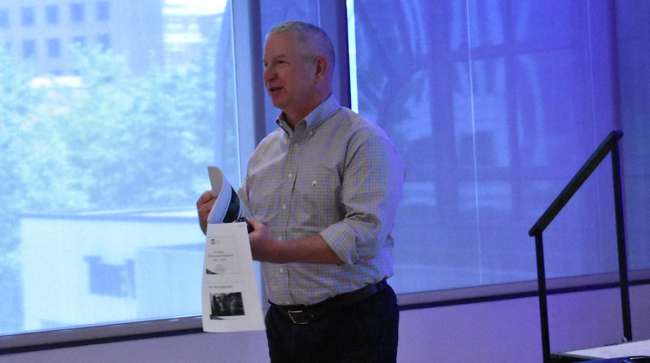Senior Reporter
Trucking Fleets Urged to Be Proactive in Litigation

[Stay on top of transportation news: Get TTNews in your inbox.]
INDIANAPOLIS — When a trucking company anticipates or gets involved in serious accident litigation, C-suite executives might want to remember one thing: Your company lives in a glass house.
That’s according to trucking defense attorney Rob Moseley, a veteran who has spent much of his time defending carriers in fierce legal battles and keeping trucker’s data and records from easily getting in the hands of plaintiff attorneys. That’s not to say the competition with specialized truck accident attorneys is a walk in the park.
Moseley, who spoke at a June 3 Truckload Carriers Association’s 2024 Safety and Security Meeting, is the founding partner of Greenville, S.C.-based Moseley Marcinak Law Group.
RELATED: Truckers Urged to Get Vocal on Regulatory Challenges
Moseley said there’s a good chance a trucking defense attorney could face a member of a large notorious group with hundreds of plaintiff lawyers, the Academy of Truck Accident Attorneys. The members feature law firms with such names as “The Truck Accident Law Firm, The Law Firm for Truck Safety, California Truck Injury Law and Truck Wreck Justice.”
To be a part of the group, plaintiff attorneys must impress the group’s leadership and have passed “a rigorous testing process to ensure an accomplished level of knowledge, experience and capabilities in the specialized area of trucking litigation.”
Corey Cox of the Tandet Group of companies discusses how early AI adopters are beginning to harvest the latest wave. Tune in above or by going to RoadSigns.ttnews.com.
Such litigators are not your basic billboard truck accident attorneys who tend to churn cases fast, seeking more moderate out-of-court settlements rather than large nuclear jury verdicts.
“They work really hard,” Moseley said. “They spend a lot of time collaborating with each other. They do focus groups with each other. They do mock trials with each other. Some of the members have even gone out to spend two weeks in Montana in an intensive study class to get their CDLs.”
Moseley said one of the major challenges truckers face in accident litigation is that so much of a motor carrier’s data can be easily obtained by plaintiff attorneys. For starters, there are 17 different sites with a variety of downloadable data available from the Federal Motor Carrier Safety Administration, files that carriers are required to provide. They range from licensing and insurance to Compliance, Safety, Accountability program information.
“There are now plaintiff attorneys that are subscribing to these databases, which is not a good thing,” Moseley added.
Moseley’s hero is not a tough-talking movie-star cop. “My hero is a protective order,” he said.
The idea is that if we’re going to litigate these cases, we need to protect our data.
Rob Moseley of Moseley Marcinak Law Group
“The idea is that if we’re going to litigate these cases, we need to protect our data,” he said. “And if they get produced without being covered with a protective order, the first thing that’s going to happen is data is going to be shared with plaintiff lawyers.
“You guys have to be sophisticated legal purchasers. When you’re stuck in litigation, you need to make sure your lawyers are asking for protective orders before you give up information. Hire a lawyer early to allow certain records to be protected as work product.”
Want more news? Listen to today's daily briefing above or go here for more info
Moseley said it probably is not a good idea to generate reports that could be sought by a plaintiff attorney. “And too many emails inside the office also can be sought by the opposition. If you email around your office, it’s going to be there forever. Nobody ever really cleans out their emails. They never really disappear. They’re forever.”
He added, “What you’re doing is you’re defeating your retention policies when you put stuff in emails. If your policy says you only keep documents or data for six months, get rid of them in six months.”
Of course, Moseley said truckers have a right to build or write their own policies on the length they retain documents. If a carrier has a retention policy in writing, and abides by it, a judge likely will show a carrier deference.
“But make sure to destroy it in 90 days,” Moseley said. “For example, if you say you’re going to keep a certain type of document for 90 days, and if there is no requirement by FMCSA to keep it longer, then the judge is likely tell the plaintiff attorney, ‘They got rid of it after 90 days. You can’t see it.’ ”





